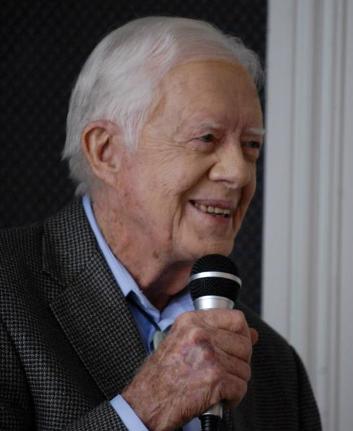By Bob Allen
As 39th president of the United States, Jimmy Carter got to know some of the most influential leaders of the 20th century, but he says none impressed him more than Clarence Jordan, a farmer and white Baptist preacher who founded Koinonia Farms, an experimental interracial community that spawned ministries including Habitat for Humanity.
 “I know great men,” Carter said at the opening session of a recent Clarence Jordan Symposium in Americus, Ga., covered by Mennonite World Review. As examples he mentioned Egyptian President Anwar Sadat and Nelson Mandela, an anti-apartheid activist and former president of South Africa. “But I remember on an equal basis with Nelson Mandela, Clarence Jordan,” he said.
“I know great men,” Carter said at the opening session of a recent Clarence Jordan Symposium in Americus, Ga., covered by Mennonite World Review. As examples he mentioned Egyptian President Anwar Sadat and Nelson Mandela, an anti-apartheid activist and former president of South Africa. “But I remember on an equal basis with Nelson Mandela, Clarence Jordan,” he said.
Jordan’s progressive ideas about racial equality in the 1940s and 1950s made him a controversial figure in the segregated South by the time he died of a heart attack at age 57 in 1969. “What Clarence Jordan did was 13 years before Rosa Parks sat in the front of a bus in Montgomery, Ala., and before Martin Luther King Jr. became famous,” Carter said.
Carter, whose White House Chief of Staff, Hamilton Jordan, was Clarence Jordan’s nephew, said he keeps a copy of the “Cotton Patch” New Testament that Jordan translated from the original Greek into vernacular of the Deep South, on his desk.
“Life has been transformed — secular life and Christian life — because he lived,” Carter said of Jordan, who would have been 100 years old this year.
The Sept. 28-29 symposium, attended by about 400 people, kicked off a month of activities celebrating not only Jordan’s birthday but the 70th anniversary of the founding of Koinonia Farms in 1942.
Armed with a degree in agriculture and a Ph.D. in the Greek New Testament from Southern Baptist Theological Seminary in Louisville, Ky., Jordan and his wife, Florence, along with another couple, former American Baptist missionaries Martin and Mabel England, moved their families to a 440-acre tract of land in rural South Georgia they called “Koinonia,” a word meaning “communion” or “fellowship” in New Testament Greek.
One of Jordan’s many ideas was “Partnership Housing,” a project to build and sell quality, affordable homes at cost with a no-interest mortgage for low-income area families. Jordan died before the first house was completed, but the concept prompted five-year Koinonia resident Millard Fuller to walk away from a successful business career at age 29 and, with his wife, Linda, launch Habitat for Humanity International. With advocates including former President Carter, Fuller’s “theology of the hammer” led to volunteer construction of 300,000 homes worldwide by the time of Fuller’s death in 2009.
In 2005, Habitat fired Fuller from the organization that he founded and nurtured for 29 years. Instead of dwelling on the past, the Fullers joined a group of like-minded partners in April 2005 to launch the Fuller Center for Housing, a covenant ministry partner that works with organizations including the Cooperative Baptist Fellowship in Atlanta.
The Jordan Symposium was immediately followed by a month-long Renovation Blitz Build Oct. 1-26 to renovate and rehab buildings on the farm, some of which have been largely neglected since their construction 70 years ago.
The celebration wraps up with a Koinonia Family Reunion Oct. 26-28 for both those who have visited Koinonia in the past and for those who always wanted to.
Previous story:
